- Home
- Tricia N. Goyer
Whisper of Freedom Page 9
Whisper of Freedom Read online
Page 9
"No, I am very certain. Even in the shock of what happened, I could not forget the sight of an American woman and a Negro driver."
Michael chuckled softly, yet his eyes told Father Manuel that something was amiss. "No, I am certain one would not."
They resumed walking, and Father Manuel's stomach growled as the scent of chicken and other heavenly aromas filled the air.
"So my friend was with her driver. That makes sense. Did you happen to see her with any others? I am trying to find her, you see, and any help you give would be very much appreciated."
Father Manuel's footsteps slowed as he tried to think back. Then a tension caused his limbs to tighten as he remembered the woman had been with the man in the black hat—the very one who asked him to come to France, the one who also urged Father Manuel not to tell anyone of their meeting. Still, a priest could not lie. Besides, maybe this was an answer to the prayer he'd prayed not an hour before, prayer that the American woman would be okay. Yes, he was sure of it now. This man would help her.
"Yes, I saw her with two others. An American volunteer and a man with a black hat. I saw them talking often in the garden, though I could not hear them." Father Manuel shrugged. "I wish I could tell you where she is now. I only hope she is okay."
"I am sure she is fine. It seems those very men care for her now. And it is also helpful to know that she was looking for help from her friend José. Thank you for your assistance." He paused for a moment. "And now I can be assured that these three men have accompanied her all along. It helps me to piece some things together, and maybe—it is my hope—to find her."
"Sí, I am happy to offer such help," Father Manuel said as they entered the large dining room. "And when you do find her, can you tell her that I am praying for her? Can you do that? "
Michael nodded and pursed his lips. "That I will, Padre. That I will."
Chapter Ten
Sophie used clean water and a little soap she found to scrub the kitchen of the small house. It wasn't really a kitchen, just one corner of the main living space. But it contained a sink and a hand pump for fresh water. A cookstove, a few cupboards, a table with two chairs, and a large window looking out the front of the house completed the area. On the other side of the room sat a rocking chair and a store-bought sofa. Sophie imagined it was quite the purchase, considering that the rest of the items, and the house itself, appeared to be made from scraps of material most likely gathered at the job site. She turned to attack the film of dirt on the windows when she heard footsteps.
"Stop!"
Sophie's heart leapt. She turned to see Philip standing in the doorway, extending a hand toward her.
"What's wrong? Are you trying to scare me to death?" She set down the rag on the small wooden table and placed a hand over her racing heart.
"It 's just that we don't want it too obvious that anyone is here, that's all. Clean windows and a swept front porch will give it away. Walt's working outside to hide the fact that we’re here."
Sophie took a step closer to the window. Sure enough, Walt was sweeping a leafy tree branch across the tire tracks in the driveway.
She placed a hand on her hip. "I suppose these precautions make sense. But did you forget a small community already knows we're here?"
"Actually, they don't. They saw us earlier, but they don't know we stopped here. The man and his daughter promised not to tell, remember?"
"All right." She nodded her chin toward the other room, set off by a door. "Can you help carry the feather mattress outside to air it? I found clean linens in the bedroom."
Philip didn't wait for Sophie to grab the other end. Instead he flung the mattress over his shoulder and carried it outside, laying it over the wooden fence behind the house. Then he sank to the ground, patting the green grass beside him for Sophie to sit.
Sophie sat next to Philip, shoulder pressed against shoulder. She tried to imagine what it would have been like to live here. The old man said the woman's husband had worked at the mines. She imagined a simple existence caring for this property, feeding the chickens, growing a garden, and awaiting the arrival of the man she loved at the end of the day.
Perhaps the woman walked down the road to meet with friends. Or maybe, like Eleanor—whose Bible Sophie carried—her closest friend was the Lord.
Sophie plucked the small wildflowers that grew within arm's reach and created a bouquet. The sweet scent of the flowers perfectly matched her mood. She turned to Philip.
"Can I ask you something?"
"Hmm?"
"The name you picked today . . . well, you told me before about your friend, how he died here in Spain. But you've never really told me about your past. Did you meet through your track- and-field training?"
"No. Attis and I were childhood friends. We lived right down the street from each other. Every memory I have of my growing-up years seems to involve him."
Philip grew silent, and Sophie could almost imagine the pictures floating through his thoughts—two little boys . . . their laughter, their play, their mischief.
"Sometimes it's hard to remember he's dead, and this war cost him his life. One bullet to the forehead, and he never took another breath. I guess I haven't had much time to stop and think about it, with the war, the fighting, the running. But the last few days, well, I've had time to think."
"I can't imagine losing someone so close . . . I don't want to." As she said those words, the unwelcome memory of Michael's funeral filled her thoughts. She quickly pushed the pain-tinged memories out of her mind. "I've seen a lot of battlefield injuries. I've heard the pleadings of men who begged me to kill them."
A shudder traveled up her spine, and she refused to let the images of crying men and broken bodies reclaim her thoughts. "At least your friend's death was something quick. He didn't suffer, right?" Sophie was grasping for the right words, but she didn't know what else to say.
"Actually, I'm not sure if it was better. If an illness had claimed him, I would have had time to adjust. I could have said everything I never had a chance to say. I could have told him how much he meant to me. I could have asked his advice about women." Philip chuckled, though the sadness remained in his gaze. "Attis was married, you know. And I still can't make myself write Louise. It's cowardly."
Sophie didn't rush in with words. She waited for him while he dug the toe of his boot into the dirt, letting him figure out how to say what he'd held inside so long.
Finally Philip cleared his throat. "He was there. We were laughing and joking, and then he was dead. Just like that. I wasn't gone more than thirty minutes. It seems like a bad joke. And you know what? I can't cry about it. I feel bad, so why can't I cry?"
"I don't know. I wish I had an answer. Sometimes I wonder the same. Knowing Luis is dead—because of me. Wondering about José. Thinking about . . . well, how I was deceived."
Philip didn't reply, and Sophie didn't need him to. It was enough they were together and sharing their pain. Sophie knew things weren't back to where they had been when they both left Guernica. Their excitement of mutual attraction had died down, but perhaps it was better this way. Now they chose to care, each knowing the other was far from perfect. A lot had happened that they still needed to talk about. But this was a start.
After a few minutes, Philip tapped his fingers on his knee, no doubt to some melody that played in his head. Sophie glanced at his wrists—still raw from the rope. She wished she could take his large hand between her two smaller ones. Wished she could tell him that they'd get out of this, the gold would be saved and the profit would help the people who had little hope. That in the end they'd be together. And then, when the conflict in Spain faded into a memory, they could start anew and explore the budding feelings of love they'd previously confessed.
But she could make no promises. To do so would be foolish. God had a plan; that was one thing she knew for sure, but to assume the plan meant she and Philip would end up together . . . She couldn't presume on God like that. She'd tried it once befor
e . . . and, well, she decided that instead of running toward a relationship, she'd give her love and then leave the results up to God. Love worked no other way.
Walt rounded the corner and paused when he spotted them. His jaw dropped slightly. "Glad you two feel the day's work is done," he called. "Sorry to ruin your siesta, but we need to round up some food for dinner, and then we need to talk." He ambled toward them. "I'm hiking out tomorrow—leaving for the closest town. We need to plan and"—he pulled out a revolver and handed it to Philip—"talk about what might need to take place to ensure the gold is protected."
Philip took the revolver and nodded.
Then Walt lifted his head and scanned the sky. "I know this place is deceptively peaceful, but we can't forget the real dangers out there."
"You're right." Philip rose and brushed his pants off; then he turned and offered a hand to Sophie. "No more fun. No more heart-to-heart talks until we're safe."
Her eyes widened, and then Philip laughed.
"Fine, then." She placed her hands on her hips. "I'll keep all my deep thoughts to myself until we're safe." With a toss of her hair, she moved toward the henhouse. "Anyone know what to do with these hens? I'm tasting eggs Benedict. Some ham—lemony hollandaise. Yeah, and maybe just a fried egg will be fine."
Laughter carried her steps forward, and Sophie walked with a lighter step. Walt's comment was a good reminder, but it did not put a damper on the warm feeling that now spread through her chest. Philip trusted her—he'd shared his heart.
* * *
The sky was steely gray, and the first rays of dawn stretched their fingers over the crest of the mountain peaks. Sophie stepped out the front door, noticing a refreshing chill in the air. She was thankful the day wouldn't be as hot as yesterday. Walt wanted to leave today, and she hated the thought of his hiking through the heat.
She moved to the henhouse and peeked in. Most of the hens slept, their heads tucked under their wings. She hated disrupting them, but her stomach rumbled, and she didn't want to wait for the sun to rise before starting breakfast. With so much happening, last night's dinner had left them wanting. She'd only managed a thin soup made from a few potatoes she'd found in the garden. It hardly satisfied, but they'd been too tired to care.
They'd fallen asleep before the sun had even set, Sophie in the bedroom, Walt in the barn with the truck, and Philip on the sofa in the living room. Sophie didn't know if it had been for her protection or because the sofa was soft that he had chosen to sleep there instead of the barn, but knowing he was there helped her to sleep better. Through the thin walls the sounds of his occasional snoring had comforted her, especially when she awoke and remembered again where she was.
The hens welcomed her with low cackles, and Sophie smiled, wondering what her mother would think of the city girl learning country ways. She slid her hand under the nearest hen, who clucked peevishly.
"Don't sass me." Sophie shook her head. "You can share your eggs, can't you? It's better than being someone's chicken dinner."
She checked under each hen and gathered six eggs, imagining how proud Philip and Walt would be when they saw her bounty. Casting one last glance at the nestled hens, she moved out of the henhouse and quietly latched the door.
Before she took one step, a force knocked her to the ground. A low growl filled her ears, and Sophie felt a scream rising in her throat.
She called Philip's name and covered her face with her arms for protection. Yet instead of attacking her, the hungry beast lapped up the now-broken eggs with wolfish greed. Even in the dim moonlight she recognized it as the thin mutt that had been wandering around yesterday.
"Stupid beast. Now look what you've done!" As if in protest, her stomach growled. She raised her hands and pushed the dog out of her way. His skin clung to his bones, and immediately her anger turned to pity. Poor thing.
She wondered if this had been his home—wondered if he'd been abandoned when his master died.
"Sophie?" Philip's voice called to her. "Are you all right?"
As he rushed toward her, she heard a click—the cocking of the pistol Walt had given him.
"I'm fine. It's just a dog. Don't hurt him. He meant no harm."
Philip approached with slow steps and gazed down at her. His eyebrows lifted at the sight of the dog still licking at the dirt and the bits of eggshells. "I suppose that was our breakfast."
"Unfortunately." Sophie lifted her hand, and Philip took it and pulled her up.
"And I was hoping to get something decent in Walt's stomach before he headed out." She sighed.
"Too late. He left an hour ago. He tapped on the front door and told me."
She wiped her hands on her skirt, noticing how they stung, and then brushed off her backside. "Really? That's what must have woken me, without my realizing it."
Philip squatted and scratched behind the dog's ear. "Poor thing."
"You shouldn't do that." Sophie took a step back. "You don't know what kind of bugs that thing carries."
"As if we don't?"
Sophie crossed her arms over her chest. "Good point." She stepped on the eggshells on the ground, crushing them into fine pieces. "Still, if you're too nice he'll want to stay."
"Yeah, you're right. What should we name him?"
"Are you serious?"
"How about Badger? Or maybe Sonny?"
"I think I like Badger better … little weasel, taking our eggs. Or maybe Weasel?" Her tone was playful; she couldn't help warming to the dog. He was no taller than her knee and had black fur, and brown and black whiskers that gave him the appearance of an old man.
"He is an ugly thing," she mumbled, but her heart warmed to see Philip acting so tenderly to a dirty, mangy beast.
"Yeah, but he's so ugly, he's cute. Isn't that right?"
The dog's tail wagged in agreement.
"Still, we have no breakfast."
"Well, maybe I can dig around the garden. I think I saw a few more potatoes. We can fry them up." He stood and brushed his pant leg. "It can tide us over anyway, until Walt returns."
"Boy, are you a dreamer," she said with a sigh. "I saw some flour and oil in the pantry, too. I can try for pancakes. Still, I would give anything for some fresh yeast rolls and Boston cream pie."
"How about smoked salmon from the Pacific?" Philip added as they strolled back to the house. "And just think, I used to complain to my dad when we'd have fish again."
They slowly made their way to the small cottage. Philip opened the door for her and she paused, staring up into his face.
"So do you think we'll ever get back? To the United States. I mean, even if it weren't for the gold, there is the war, and . . . well, the border seems farther than when we started, not closer."
He reached up and brushed her hair back from her temples. "Yes. I have faith that we will get home someday." He leaned close as if to kiss her forehead.
The dog scratched sharply on Sophie's leg, interrupting the tender moment. She jumped back. "Ouch, that hurts." She pushed the dog away, but he didn't stop. Finally, when he saw he had her attention, he raced through the backyard, under the fence, and toward a small hill behind the house.
"I think he wants us to follow." Philip jogged after him.
"Wait . . . I'm hungry!" she called. "And I was liking the feel of your hand on my face," she mumbled more softly.
Then Sophie crossed her arms, realizing it was the second time the dog had ruined a good thing. She was just about to enter the house and start the pancakes anyway when Philip's voice broke the silence of the morning.
"Sophie! Come quick!"
Chapter Eleven
The blue and white flyer in Father Manuel's hand read Paris on Display. Most likely Berto had slid it under his door. Truth be told, he had no interest in venturing out again. His heart weighed too heavy. He missed serving God and the people.
He felt emptied. More than anything, he needed living water. Christ offered to penetrate his weary soul, and he now realized how dry it had become
.
And so, with sure steps, he found his way to the courtyard and took a seat on the polished wooden bench, placing the paper on the bench and folding his hands. The morning sun settled on his shoulders like a warm blanket. The grass had been neatly trimmed, and every bush shaped in precise arches along the border near the gate. The flowers danced in the breeze, and the song of birds in a nearby tree reminded Father Manuel of the first garden tended by Adam. Father Manuel had always pictured a lush, untamed wilderness—like the one he walked through back home. But what if Adam had also liked to manicure his surroundings? Maybe he, too, appreciated control and design in his private garden—a small reflection of the creative nature of his God.
Prayers spilled from Father Manuel's lips, and soon he slipped from the seat to kneel in the soft grass, lifting his arms in prayer. He wasn't sure how much time passed as his lips mouthed prayers to the Lord, but eventually the morning sun hovered high overhead—beaming warm rays upon his head.
He rose, struggling to his feet like an old man. He chuckled with the memory of the first time his legs had fallen asleep during prayer. It didn't seem right. He wished that when it came to kneeling priests, God would void the laws of nature, the laws of blood circulation—a small reward for those who served with dutiful diligence.
As he stood, Father Manuel noticed movement in a second-story window, and he nodded to the man he saw observing him. He was older than Berto's cousin Michael, but their features were similar. Father Manuel decided it was Berto's father, who'd unfortunately missed last night's dinner.
Father Manuel lifted his hand to wave, and the man took a step backward as if startled that he'd been seen. He offered a quick wave in return, then moved to close the heavy drapes. Father Manuel wasn't certain what that was about, but he did hope to meet the man soon. He had much to thank him for. In fact, the overwhelming feeling of undeserved mercy rested upon him.
Though yesterday Father Manuel questioned if he should accept the offer of a free room, today he was glad he had. His soul already felt refreshed, his mind clearer. Worries about receiving this gift disappeared from his soul as he realized one thing—God had brought him here, to this fine house and these fine people, for a purpose. In fact, the more he'd thought about it, the more it felt like a mission. The discovery that Berto's cousin knew the very woman he'd urgently prayed for confirmed that. He was here to provide something even more valuable than what he received—but to whom he'd bestowed his favor he did not know. Berto? Michael? Berto's father?

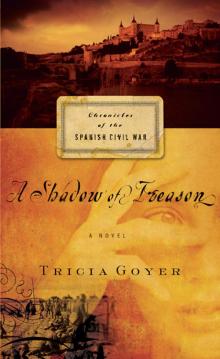 Shadow of Treason
Shadow of Treason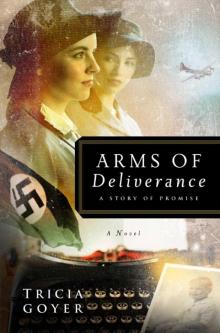 Arms of Deliverance
Arms of Deliverance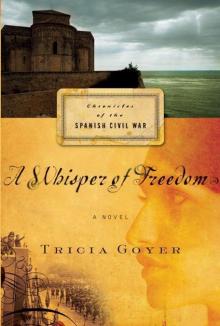 Whisper of Freedom
Whisper of Freedom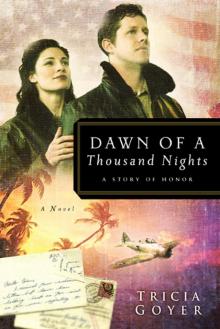 Dawn of a Thousand Nights
Dawn of a Thousand Nights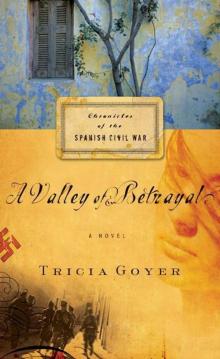 Valley of Betrayal
Valley of Betrayal